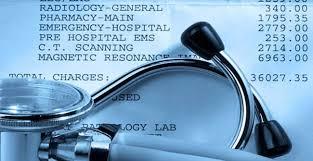Outstanding medical debt has become a common theme among personal bankruptcies in America, according to a March survey in the American Journal of Public Health – with nearly 60% of people admitting a medical expense “very much” or “somewhat” contributed to their bankruptcy – more than the percentage who cited home foreclosure or student loans.
As The Atlantic‘s Olga Khazan notes, this “uniquely American phenomenon” is due to a number of factors, including an increasing lack of insurance, crappy high-deductible insurance, and a woefully erroneous medical billing system.
There are as many reasons for the medical-debt crisis as there are diagnostic codes that rule the medical-billing world. In interviews, half a dozen consumer advocates told me they are concerned that the problem will get worse, since the uninsured rate is going up, and more people are signing up for cheaper but skimpier health-insurance plans introduced by the Trump administration. More Americans are also now on high-deductible health plans, many of which require patients to pay thousands before insurance kicks in. Networks of doctors have grown narrower, meaning more providers are likely to be out of network. –The Atlantic
In other cases, hospitals required by some states to provide charity care to certain low-income and uninsured patients have been caught sending out regular bills instead.
“We were seeing hospitals sending debtors to debt collections without saying anything to the debt collectors,” said Emilia Morris – legal direct of Central California Legal Services. “The debt collectors are trying to collect these debts without making charity care available. The patient sometimes gets sued, gets a judgment entered against them, without ever having heard of charity care.“
In a statement, an American Hospital Association spokesperson told me that in 2017, hospitals provided more than $38 billion worth of care to patients who could not afford it otherwise. “Hospitals across the country strive to find ways to help under- and uninsured patients navigate the health system,” the spokesperson said. “Hospitals offer charity care programs, check public assistance to see if the patient qualifies and provide discounts to these patients when possible. Every day, America’s hospitals treat patients who can make only minimal payment, or no payment at all.” –The Atlantic
Despite the financial assistance, around 20% of Americans have a medical claim on their credit report, and around the same proportion have an overdue medical bill. In fact, the Consumer Financial Protection Bureau (CFPB) reports that medical bills are the most common cause of unpaid bills sent to collection agencies.
The most common cause of large medical bills? Emergency-room visits and planned surgical procedures that patients can’t afford to pay, according to advocates. In many cases, a hospital may be covered under a patient’s insurance network, but the individual doctors who work there and the ambulance provider aren’t – often leading to “balance billing” in which patients are billed for the amount insurance will not covered.
Advice?
Consumer advocates tell The Atlantic that patients should ask about financial assistance – including charity care for the uninsured.
If that fails, patients can ask whether they can pay whatever the hospital would have charged someone who was on Medicare—typically a lower rate. Hospitals and even collections agencies will often agree to payment plans, or a discount in exchange for a lump-sum payment.
Still, the current system requires people to independently negotiate on their own behalf with giant corporations over tens of thousands of dollars, often while recovering from a major illness. For those who haven’t done it before, the process can be confounding. “Maybe I didn’t say the right thing before,” Lockett told me. –The Atlantic
Small outstanding medical debts are now getting sold to debt buyers – who try and collect as much as possible on long past-due debts.
“Now we are seeing small-time medical practices get involved in selling their bad debts to debt buyers for pennies on the dollar,” says Simon Sandoval-Moshenberg – legal director at the Legal Aid Justice Center, who adds that at the end of the day, a person who is at imminent risk of having their wages garnished because they’ve been sued for medical debt may find the best course of action to declare bankruptcy.
via ZeroHedge News https://ift.tt/2F9zC1e Tyler Durden
